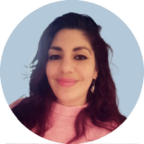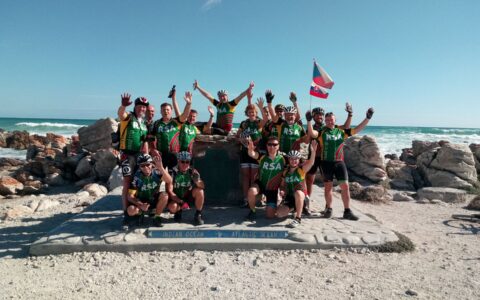“It's not just lip service”: Tia Callaway on the Ripple Effect of Business Coaching
With all the business coaches out there, Tia Callaway’s approach stands out for its strong emphasis on making a tangible impact. As a partner in Alberta, Canada-based Sonic Breakthrough Coaching, her passion for driving measurable outcomes has seen her transform the journeys of many small businesses, helping them unlock their full potential and achieve remarkable growth.

But Callaway didn’t achieve her success overnight, and neither was it easy for this mother of two. It took 14 years of guiding business leaders and owners toward achieving their professional aspirations, starting in the corporate world as a recruitment lead with Starbucks. During this period, she managed to carve out her own path in the coaching industry, merging traditional business consultancy and personal therapy to create healthier workplaces.
We sat down with Tia Callaway to discuss the importance of combining business strategy with psychological principles and how she balanced work and family while developing her career.
What first ignited your passion for business coaching?
My career started with Starbucks. I was in management with them and moved up quite quickly within the organization. They created a position for me that had never existed before. It was a district recruitment lead and kind of a pilot project.
There were many personnel problems sometime in 2006. Companies were having trouble keeping people, and employees were moving from one job to another. The economy was just booming, so there were many job vacancies. It was definitely an employees’ market.
They gave me a position where I was responsible for supporting the district recruiting team in hiring managers, which was fantastic. Finding people who were a fit and embodied the values of Starbucks was something I was exceptionally good at. And it was great to be able to support many different stores throughout their opportunities.
What led you to become a partner at Sonic Breakthrough Coaching?
I was with Starbucks for about five years. When I had my kids, I wanted to be able to be home with them. I stepped away from the corporate world and started working with a small business owner to support her and her company.
I did everything with her in operations and helped her set up more formal processes. As she grew the company, some rules had to be established and manuals to be created. I spent six years with her, and it was part-time for quite a while as my kids were young.
I'm not somebody who's good at doing nothing. Working fulfills me. It’s my time to be me, not mom, to be Tia, and not have somebody relying on me for snacks all the time.
At the end of my time with her, the part-time work was great but required a lot of evenings and weekends. And my kids just started school. I wanted something where I could have my evenings and weekends free because that's when they were home.
So, I started working for Oliver Baezner, now my business partner. I did admin work for him, which allowed me to work nine to five. At the end of the day I could go home and be with my kids and my family.
Once my kids reached the age where I could say, “Okay, it's time for me to make a career move,” I sat down with him, and we discussed it. We found that my past experience led directly to what he does.
Part of my job at Starbucks was visiting some branches and fixing broken stores. We rely on that turnaround experience and strong corporate experience when assessing our ability to coach other entrepreneurs and business owners.
We discussed my skillset and how we could leverage that into the company. And as I developed my side of the business, I became a partner in the firm.

How did you meet the woman entrepreneur, and what was she doing?
She is an independent real estate investor with a portfolio of properties that she owns and manages. We were renting from her. That's when she said to me, “You're one of the most organized tenants I've ever had. I know you have two small kids at home, but if you're ever looking for something on the side, I could use some help.” I said, “Absolutely.”
So, we kind of organically fell into that together. She's a very driven businesswoman, so to watch her achieve what she achieved was very motivating. When you work with someone who's very driven and consistently achieves subsequent success, you can't help but say, “I can do that.” It was a wonderful time working with her, and it was exactly what I needed back then.
What would you say was the turning point in your career?
If there was one big turning point for me, it was finding the lady I previously worked with, given that my career started in the corporate atmosphere. Being an entrepreneur herself and getting into that small business world was where I really felt like I had an impact.
I felt like a lot of these experiences that I gained through corporate careers, people who were entrepreneurs don’t have. They don’t necessarily understand the impact of being strategic in their business, or the impact of having policies and procedures documented or instated, even though they may only have three employees.
They don't understand that 90% of people who start small businesses are somebody who excels at their craft. So, they start businesses for themselves, but they don't naturally have that strong business background.
I always say I'm not an “ideas person.” I am a businessperson. However, I realized through going into that small business environment that small business is where I wanted to stay. So, when I was looking for something more than nine to five, I wasn’t looking to get back into the corporate world.
I wanted to go somewhere where I had an impact, where my experience was valuable, and where I could help people.
What do you think are the biggest misconceptions about business coaching?
People often assume that our job as coaches is to come in and tell them what to do in their business. I would say 99% of what we do is not telling anyone what to do but really helping them work on developing skills. For the most part, we do a lot of personal development, mindset shifts, and looking at how they view things, how they interact, and where something broke down.
But we never tell anybody what to do. It's always their idea. We just help them understand the work required for their ideas. It's more like that partner you have with whom you can talk things through and bounce ideas off.
We don't have goals for our clients. Our goal is their goal, and we’re helping them achieve it.

What challenges come up when you're helping business leaders accelerate their performance?
The challenges are often not the same because every client is different. So, it's about us helping them through those individual challenges. That can be around their team or the culture that they've built. It can be around not having the support they need to be able to step back and work on their business.
While companies or leaders sometimes face similar challenges, the path they must take is always different because they have different teams and goals.
What ultimately brings you satisfaction in your work?
I have a very strategic viewpoint when I look at things. Sometimes, when we're close to something, we're too close to see the solution. So, it’s about being able to help companies or leaders take that step back. And find that path where they say, “Oh, right, this is something we can do,” and allow them to feel confident navigating it again.
If we start working with a company and there is a big mountain in their way when we lay it out, help them understand it, and take that step back, it doesn't seem so big anymore. It becomes easy. It's like business therapy. We're here to give them strategies and tools, and then they get to use them organically as things come up.
I noticed you're working on getting your bachelor's degree in psychology. How important is this area of study for your coaching career?
Psychology, for me, has always been something of a passion. I was in an abusive marriage for almost 20 years, and therapy was a big tool for helping me leave that relationship. I think we need to understand the complexities of our brains and bodies. And how these cause us to react in ways that we sometimes don't have control over.
I started getting my psychology degree because I wanted to work with people in similar situations to mine who benefitted from therapy. Eventually, I would still love to work one-on-one with women who are in abusive relationships or who need that support.
A big part of what I work on with our clients is psychology-based. There are Cognitive Behavioral Therapy tools and all sorts of tools you can use to start identifying reactions and patterns and overcome them. Because, at the end of the day, that makes us better leaders and business owners. Our employees feel more comfortable coming into our workplace. It's all inherently linked together.
So, it doesn't matter whether or not you have a psychology degree; you just need to understand how much that psychological background impacts everybody. At the end of the day, you’re dealing with people, whether that’s the business leader or the team.
We’ve seen people who have worked for horrible leaders in the past, and they really do have a version of post-traumatic stress disorder. They have those reactions where when somebody raises their voice or says, “This is wrong,” they just shut down. Your employees are humans, and you need to treat them like humans. Some business leaders tend to take the approach of, "Well, they need to do what I say.”
Let’s talk about eWay. In what way has this CRM software transformed your day-to-day operations, and how does it facilitate your work?
We try to incorporate technology in many different ways. A great example is eWay. A CRM helps us organize client information and keep proper records and notes. Anyone in our organization can log into the CRM and see what's going on. eWay has been fantastic. We've used it for a long time because it links directly to Outlook. This means we don't have to attach things manually, which is a time saver.
We've been using eWay for almost ten years now. The other great thing is that, as we've grown as a company, we've been able to stay with eWay because the capacity to use it is huge. We went from using it to keep track of our client records to using it for marketing emails and campaigns.
Everyone in our business has an eWay license, which allows us to keep track of other people and their clients and ensure we're all working together. So, eWay has been wonderful for us.
How do you recharge yourself when you feel overwhelmed?
I love gardening and being in my space. When I go home after a hard day, I’m in my yard with my kids, dogs, and husband. My family is very fulfilling for me.
Exercise is big for me, too. Having that outlet helps me process things mentally, whether that be going to the gym in the morning, going on bike rides, or running or walking with my dog and my husband.
Finally, what drives you when you get out of bed in the morning? What keeps you going day after day?
I like having an impact. I like going home feeling like what I did made a difference in somebody's life. I'm also very motivated by being able to put the pieces of things together and make change happen, instead of just talking about it. We don't just say, “Oh, here are all the things you can do.” We work with our clients to actually see that impact through.
It's not just lip service or values on the wall. At the end of the day, what I do impacts somebody, and it can be from the person we're working with to somebody in that company who maybe we don't see.
We've had a number of employees come up to us and say, “Things have changed since we started doing workshops with you.” Or “I've grown because of the workshops with you.” That’s what keeps me in this field personally. There’s a ripple effect.











